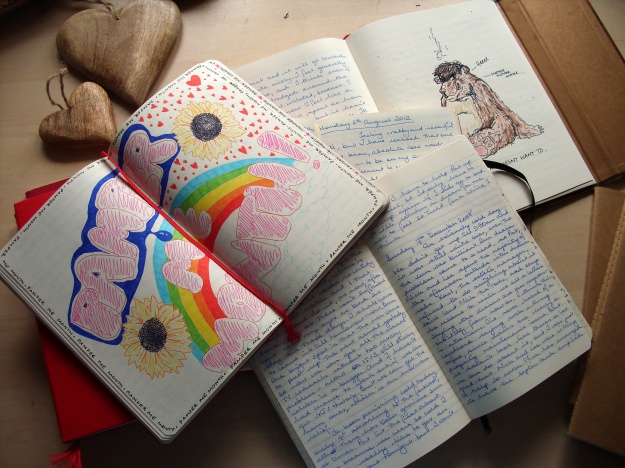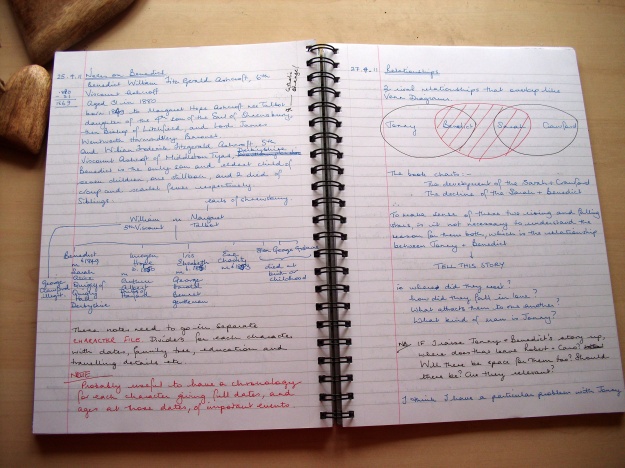This is my life right now.
Lying in bed, sleeping, reading, writing, staring out of the window, watching the clouds, listening to the wind.
I’ve had a real health crash. I’m back to the ‘having to sit down to brush my teeth and wash my face’ stage. The ‘having to go back to bed after my shower because thats all the energy gone for the day’ stage. The ‘oh, shit, how the hell did I get this bad again?’ stage.
Today, I’m regarding myself as lucky. My brain has picked up again, so I am able to read once more, but to start with it was impossible to take anything much in. There was that horrible feeling of staring at the page and knowing that the letters and words so familiar to me were completely unintelligible, that even if I could understand them, they wouldn’t stay in my mind long enough for me to make sense of the author’s ideas. Words become like soapy otters on days like this. You’ve no hope of catching them.
That’s the hardest thing for me to handle about this illness, I think. The soapy otters.
Because I am a reading addict. I was the kid that read the back of the cornflake packet at breakfast every day (even the list of vitamins) three or four times, just to keep myself entertained. As an adult, I need to have something to read continually with me, or I get twitchy.
And if I am not reading, I am writing.
Being deprived of this capacity on however temporary basis is agony. I feel lucky that it doesn’t happen too often anymore, because when I was first ill, some 17 years ago (Gods! Is it that long?) it was pretty consistent for months. I couldn’t even listen to the radio because the sound hurt my ears, and I couldn’t understand what was being said anyway.
I’m grateful to be better, believe me.
Not least because the soapy otters are harbingers of major changes.
They herald a time when I am forced to lie down and face my thoughts. They offer me a time to rest and recuperate, but also to realign. My body may be rusting like that of the Tin Man, but my soul is in hyper space. Things are shifting.
Soul shifts seem to come in spurts for me. Nothing for a long time, and then everything all at once. Maybe that’s why I am so exhausted.
My diary has taken a hammering since I’ve been able to write again. Pages and pages. So has my writing notebook. And that big notebook you can see in the picture? That’s my wellbeing workbook. That is where I write down what my body needs, what my heart and soul need too. My diary is for my thoughts and feelings. My workbook is for my vision and planning. For working things out. It is my wellbeing memory. And yes, I like to use brightly coloured pens in that one, not just to draw attention to certain paragraphs and concepts, but because I like them. They make me happy. Yay for Papermate Flair pens, I say!
You’ll notice there is another notebook in the picture, too, a black one. That’s my current writing notebook. And yesterday, I actually was able to write something in it. A scene from a story. I felt so proud of myself.
And when I have exhausted my Bloglovin’ feed, I’ve got books, though they are a bit more resistant to my brain at the moment. I don’t know why I find the written page harder to understand at times like this. The electronic one is definitely less ottery.
At the moment I am rejoicing in Danielle LaPorte’s wonderful ‘The Desire Map: a guide to creating goals with soul’, a title which is a bit of a misnomer because actually its about core desired feelings which really hits the spot. I’m a person who finds it hard to connect with feelings, so using them as a life compass is a huge and thrilling idea to me.
The other book is Tami Lynn Kent’s ‘Wild Feminine: Finding Power, Spirit and Joy in the Female Body’, which is feeling more like hard work, but I think that may because I am so resistant to the material. One of my intentions this year is to connect more to my womanness, and thats why I am reading this one. I think its going to cause a revolution. I’ll let you know how I get on with it.
And now, after writing all that, I’m exhausted again. Sorry, I had better wrap up. I just wanted to share with you where I am, the good and the bad. And on the whole, while it is an uncomfortable and frustrating place to be, I find that actually I am deeply grateful for it.
But before I go I want to leave you with an unbearably cute photo of an otter sleeping:
Yes, I know he’s not soapy, but I couldn’t find one that was. Which is probably for the best, don’t you think?
Happy Creating,
EF









